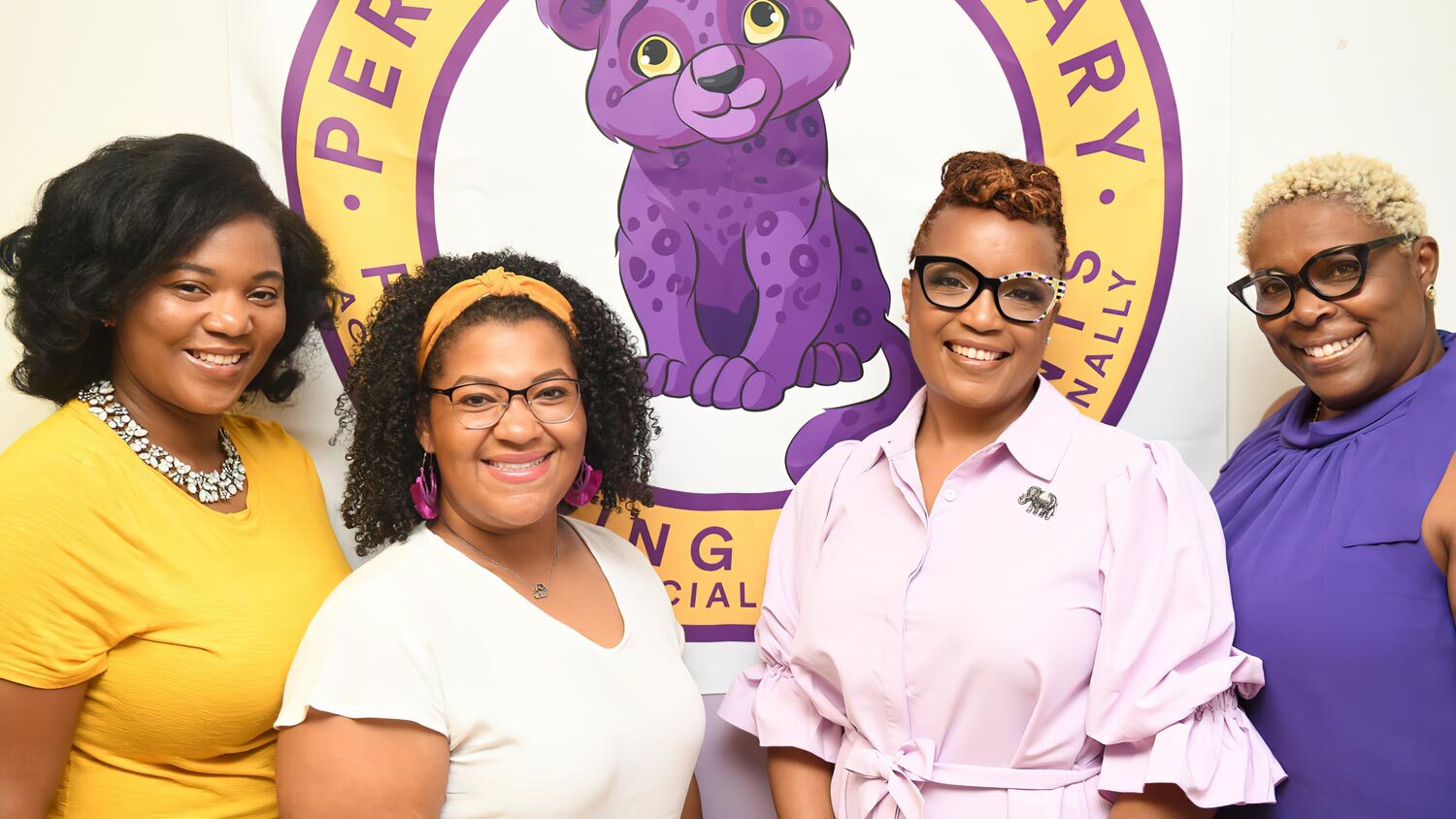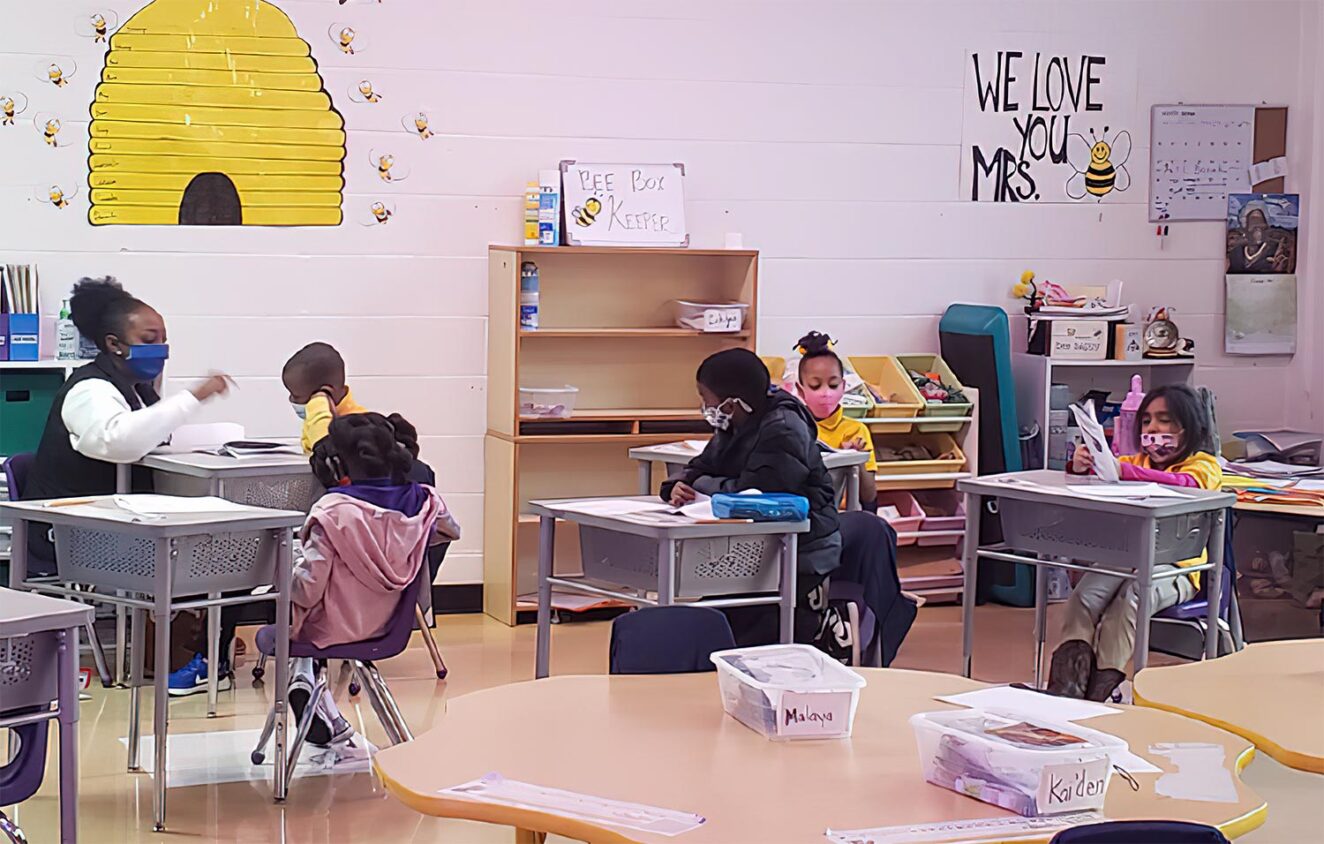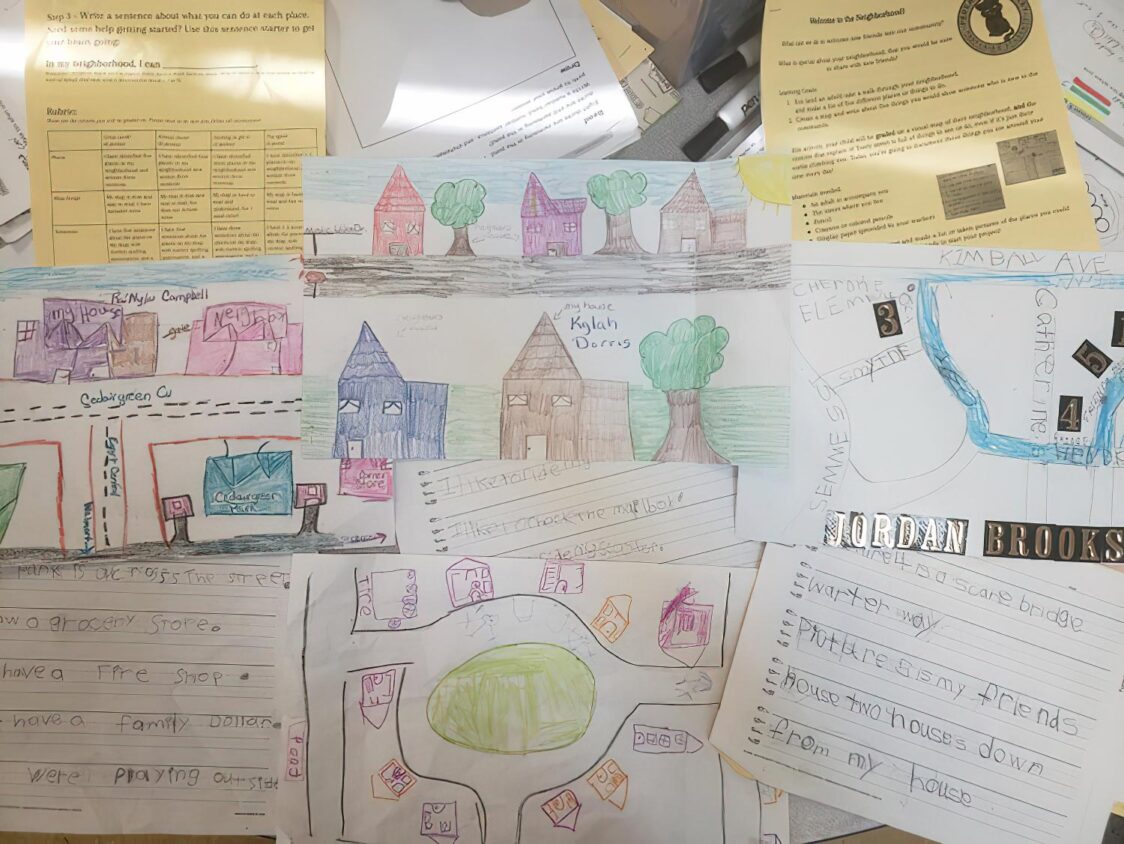Parents as Partners: Reinventing at Perea Elementary School

“Mom, you are the best teacher!” exclaims Shay Brown’s son, a first-grader at Perea Elementary School in Memphis, Tennessee.
Like millions of other parents and caregivers, Mrs. Brown has found herself working from home and overseeing virtual learning for her twin sons. But contrary to a growing national consensus that for most caregivers, becoming a teacher while maintaining a household and being a fully operational employee is unsustainable, Mrs. Brown is embracing her new role as an assistant teacher. This fall, she chose to keep her sons at home to learn virtually, despite a hybrid learning option where they would attend school in-person four days a week.
To say that this shocked me is an understatement! I’m seeing the toll this pandemic, and its uncertainty, is taking on families near and dear to me – the anxious awareness that schools could close suddenly, leaving parents who must work in ever tighter financial and emotional binds. So what is happening in this Memphis school community, where parents are choosing virtual learning and delighted to be teachers?
Perea Elementary, which serves 236 K-2nd graders, is a beloved school in the Klondike Smokey City section of north Memphis. It is one of the oldest, most vibrant African American neighborhoods in the US, dotted with churches and small businesses, and home to a connected, engaged community. Like many American towns, its population has declined over the past 60 years due to White flight and shuttering factories. Some storied schools have closed and remain vacant. When Perea opened its doors in 2018, the community embraced it.
I love this neighborhood and the community that we have built here at Perea; it is a hidden gem and a very special place.
Deadre Ussery, Perea School Leader
“I love this neighborhood and the community that we have built here at Perea; it is a hidden gem and a very special place,” says school leader Deadre Ussery. Mrs. Ussery is one of those educators who brims with love and genuine affection when talking about children, her staff, and her families. She smiles from ear to ear. And she projects a warmly demanding clarity about what must happen for young people in Perea’s halls. The school deeply embraces a Whole-Child Focus with an emphasis on Relevance: the curriculum is infused with socio-emotional learning and grounded in culturally responsive methods and content from Kifani Press, a company founded in Memphis that curates and creates diverse children’s literature. “Children now see themselves in the stories we read. They are using SEL practices in math. This helps me get up everyday and think that regardless of COVID, we are keeping the doors open until the city closes them.”
This fall, Mrs. Ussery and Perea joined Transcend’s Recovery to Reinvention cohort, seeking coaching and support to develop fall reopening plans for a hybrid and virtual model; and to begin the work of reinventing Perea’s learning environment beyond COVID.
In the spring, when school buildings were ordered to close, Mrs. Ussery and her “teamily” (part family, part team!) had a realization: family engagement is not a nice-to-have feature during lockdown. If Perea was to sustain its joyful and rigorous culture, activating parental agency was imperative. Perea’s road to reinventing needed to begin with a fundamentally different approach to building Connection & Community – bridging home and school so that they complement, not compete.
“It used to be with parents we would say, if you can get the kids to school, we will take it from there. Now, my role is ensuring that parents are educated about the learning process and have what they need to truly advocate for their children,” Mrs. Ussery says.
It used to be with parents we would say, if you can get the kids to school, we will take it from there. Now, my role is ensuring that parents are educated about the learning process and have what they need to truly advocate for their children.
Mrs. Ussery
[Perea teachers and staff] make sure that the partnership between the parent and the school is a bridge that connects.
– Shay Brown, Perea Elementary parent
Mrs. Brown, the mother who opted for fully virtual learning, confirms this. She says,
“[They] make sure that the partnership between the parent and the school is a bridge that connects. I have always been one to make it my business to be involved.” While Mrs. Brown used to regularly check up on her sons’ behavior, she is now hands-on with their academics as well, helping to practice and reinforce critical skills. She emails teachers asking for strategies and advice to incorporate into the boys’ daily routines. This kind of collaboration between home and school isn’t automatic, as the traditional design of school doesn’t encourage it. Developing these kinds of trusting relationships between home and school takes the full effort of a deeply committed staff, from the Dean of SEL to instructional assistants to teachers. It takes a full village, driven by love, to operate with intentionality and bold vision.
Caregivers and educators have unique, important, and complementary roles to play in cognitive and socio-emotional development. The science of learning and development highlights the importance of meaningful encoding and effective practice, which can be bolstered when the home environment reinforces the school environment.
Perea is rewriting the implicit school-home contract by making a fundamentally different assumption about the role that parents can or want to play. They use Zoom meetings, phone calls, texts, weekly newsletters, and Morning meetings to make learning transparent and socialize shared expectations – while forming authentic relationships between the adults who shepherd children’s learning. They provide SEL tools and resources for parents to constructively engage with their children’s “big emotions.” In meetings where a parent may threaten corporal punishment, Mrs. Ussery and the teaching staff redirect the behavior of the adult. They help a parent “Settle Your Glitter,” a mantra the school uses to help children get in touch with their emotions.

To gain families’ confidence, Mrs. Ussery also opened the school early for an immersive back-to-school orientation. This was a tremendous operational feat given COVID restrictions. Teachers and staff prepared families for what they could expect from virtual and hybrid learning. They worked to familiarize them with the technological tools, helping to build everyone’s confidence and mutual trust. Academically, Perea staff also pulled back the curtain on teaching and learning by sharing the purpose behind their phonics program and the school’s approach to building reading comprehension skills. In this orientation, parents weren’t just receiving a lecture. They were being educated so that they could be fully armed advocates, working arm-in-arm with teachers.
Schools can move beyond transactional relationships with families by teaching them new skills and ensuring that they are aware of what, how, and why their children are learning.
What’s most striking to me about Perea’s road to reinventing is that it rests on a completely undervalued resource that has been there all along — parents and caregivers! While this school community has been making tremendous Leaps in Whole-Child Focus, Relevance, and Affirmation of Self & Others all along, COVID revealed that weaving parents into the fabric of school was essential for ensuring that all these other Leaps would take root and flourish in the Perea Community. When I reflect on my own experience as a classroom teacher, I remember the unspoken assumption that pervaded the culture: your job as a teacher is to teach the babies in spite of who their parents are or what they may do or say. In that story, parents are the antagonists, not an integral part of the solution. Sometimes, despite the deepest of good intentions, when schools talk about “parental engagement,” it’s a transactional relationship, largely centered around controlling a child’s behavior, ensuring completed homework, and getting to school on time. Perea Elementary is reimaging this relationship with parents at the center of the vision.
Deeper family engagement can be a tool for equity – it builds caregivers’ agency and knowledge to advocate for their children. The combination of high, shared expectations and hands-on school support enhances the connection between school and home and enables deeper learning for young people.

I believe that Mrs. Ussery’s insight about the indispensable role parents play in the learning process and a school’s responsibility to welcome them through active mutual learning is critical for ensuring equity for Black and Brown students. More schools must make the radical assumption that parents deeply care for and want to advocate for their young people. When welcomed into the learning process, even abruptly as was the case with COVID, caregivers show up readily. If we are to reimagine schooling, we must reimagine how we engage them.
Mrs. Lusk, a parent who chose the hybrid learning model of four days in-person with Fridays designated for virtual project-based learning, observes that, “Of course, the pandemic made all of us change the way we viewed our children’s education. I do see myself now putting more effort into being creative with learning than I did prior to the pandemic.”
Mrs. Ussery and the teachers at Perea are thrilled to continue strengthening the “home and school bridge” well beyond this COVID moment, and they believe that it will endure. Mrs. Brown says it best, “As a parent, I used to send them to school and I felt like their teachers would make sure they knew their ABCs and 123s. When they got home, I had the other priorities. Now I see that even when they go back to school, I want to know what they are learning so I can help teach those skills wherever we are – at home or even in the car.”
Now I see that even when they go back to school, I want to know what they are learning so I can help teach those skills wherever we are – at home or even in the car.
Mrs. Brown
What Perea Elementary is teaching us about roads to reinventing
Caregivers and educators have unique, important, and complementary roles to play in cognitive and socio-emotional development. The science of learning and development highlights the importance of meaningful encoding and effective practice, which can be bolstered when the home environment reinforces the school environment.Schools can move beyond transactional relationships with families by teaching them new skills and ensuring that they are aware of what, how, and why their children are learning.Deeper family engagement can be a tool for equity – it builds caregivers’ agency and knowledge to advocate for their children. The combination of high, shared expectations and hands-on school support enhances the connection between school and home and enables deeper learning for young people.
Transcend supports communities to create and spread extraordinary, equitable learning environments.

